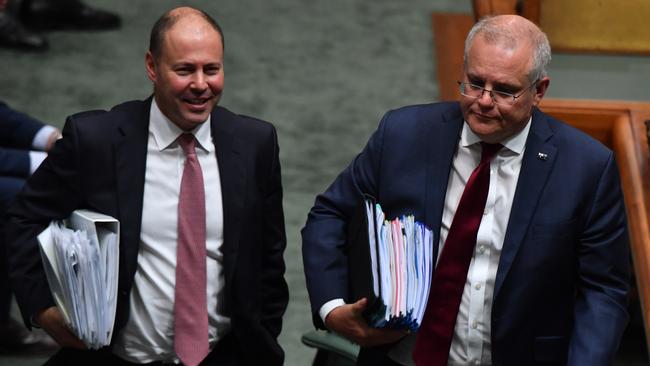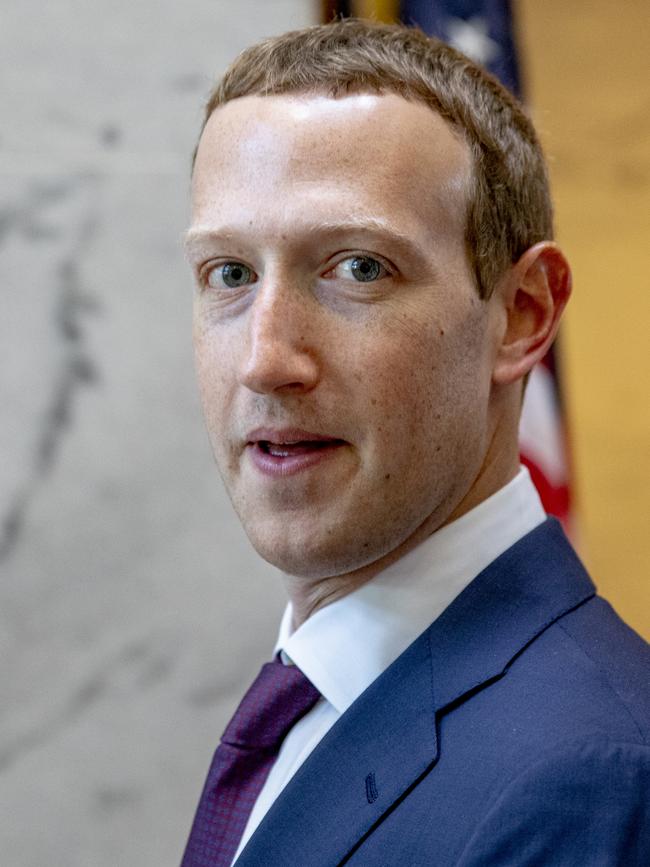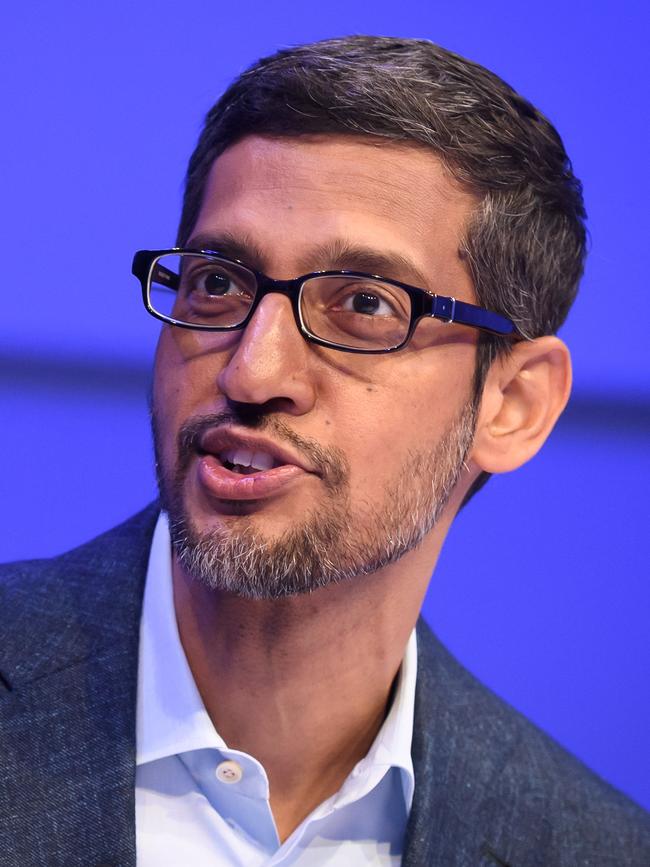Inside the 11th-hour deal with Google and Facebook
With Mark Zuckerberg ‘lawyered to the gills’, Josh Frydenberg had to find a different approach to end the Facebook stalemate.

With Facebook engaged in retaliation against Australia by a shutdown of its news content — likely to affect about 40 per cent of Australians — Frydenberg felt the tide could shift against the government and himself.
He tells Inquirer: “I felt while people were now angry with Facebook, if Facebook wasn’t part of our arrangements, the mood would turn down the track, that it would become more challenging for the government and for the Australian media companies. The media businesses would be missing out on a revenue stream and consumers would get restless because they weren’t getting news.
“I just felt sick in my stomach. I had established a good working relationship with Mark (Zuckerberg) and this was going to be a real missed opportunity. The thing about politics is you are always negotiating, you are always working with colleagues, with departments, with stakeholders.”
The ultimate success of Frydenberg’s intense dialogue with Google chief Sundar Pichai and Zuckerberg reveals two dominant characteristics of the Treasurer — he is an irrepressible negotiator and talker, and he refuses to accept surrender as an acceptable result.
Who blinked in the Zuckerberg-Frydenberg battle over the code to force big tech to pay for its use of news content? The answer is this was a highly successful result for Australia. Asked by Inquirer how much Frydenberg conceded, Australian Competition & Consumer Commission chairman Rod Sims says: “The government absolutely maintained the integrity of the code. It was always going to do that. I don’t think the Treasurer really surrendered anything at all, nothing that mattered.”
It was a victory for state power over big tech. As Scott Morrison and Frydenberg say, this will have a global import since many nations face the same dilemma. The transfers of funds from Google and Facebook to our media companies will be several hundreds of millions of dollars covering recent and future deals — though some will be value, not cash. The result is a win for Australian media companies, for journalism and, by advancing regulation of big tech, for democracy.
Yet Google and Facebook made vital tactical decisions that their best course was to accept the pathway offered them by Frydenberg and the ACCC media bargaining code. The government wanted big tech staying in this country on its terms — and this is what it got. Facebook and Google hated the final arbitration provision in the media code. This is the absolute key to the outcomes.
It is how the future was unlocked. If big tech used news content, it had to pay the media companies, and if deals were not reached the issue went to an arbiter. This was the global precedent big tech couldn’t tolerate; it was the instrument of leverage initially devised by the ACCC.
Frydenberg says: “I made it clear to both Sundar and Mark that this was an opportunity for them to use Australia as a model jurisdiction in which they could reach these commercial deals in good faith having our rule of law applied. At all times our discussions were respectful and constructive.”
With Pichai and Zuckerberg, it was mainly one-on-one dialogue with the Treasurer. Building personal trust was essential. “By having one-on-one discussions we took it away from the lawyers,” Frydenberg says. “These guys are lawyered to the gills. And there’s no way regulators and lawyers can resolve such vast differences of opinion.”
Frydenberg had been appalled by Zuckerberg’s decision late the previous week to flex his digital muscles and black out platform access to Australian news. It was massive retaliation. “This was a brutal illustration of market power,” Frydenberg says. But while expressing disappointment to Zuckerberg, he refused to be outraged. The Treasurer kept working the personal relationship that spanned more than a dozen phone calls over five days.
After reflecting throughout Monday, Frydenberg told a colleague: “If I don’t get Facebook this will leave a bitter taste.” He determined to find a way through. Frydenberg and Zuckerberg were deadlocked on the Monday morning. But after calling Zuckerberg back at 6pm Canberra time Monday evening Frydenberg put more suggestions on the table. The talks were restarted. But he was cautious, late Monday night rating his chance of success at only 25 per cent.
The pivotal point is that the weapon of final arbitration is designed to drive commercial deals between Big Tech and Australian media companies. Sims said: ““It was my personal hope that no one gets to arbitration. It is the threat of arbitration that gives the media companies their leverage.
“I anticipated that in a negotiation/arbitration model you would get the deals done at the negotiation stage. What’s happened is that we are seeing deals done even before the code became law. That’s fantastic, that’s 100 per cent success.”


The Frydenberg-Zuckerberg agreement was all but finalised at a 7.30am call on Tuesday. Two hours later Frydenberg took the code and latest amendments through the partyroom, the meeting where Craig Kelly announced he was quitting the party.
Frydenberg faced a tight deadline; the code was going to be legislated by the parliament. Time was running out. The press release was drafted. But you never know with Zuckerberg. There was still toing and froing.
Early Tuesday afternoon Frydenberg rang again and read out a crucial paragraph from the proposed press statement by the Treasurer and Communications Minister Paul Fletcher: “The government has been advised by Facebook that it intends to restore Australian news pages.” Zuckerberg said “OK”. That happened at 1.55pm. Frydenberg closed the circle. He went into question time with a smile.
The cash and value added constitute substantial results for the companies and journalism. The reform is a unique event that breaks the usual dismal cycle of reform failures in this country. It was driven by three factors — the policy design work undertaken by the ACCC that created the model; the unusual concord struck by media companies that saw Nine Entertainment, News Corp, the ABC and Guardian Australia in agreement; and the eventual bipartisanship in parliament between Coalition and Labor.
But there is a small group of angry critics that reject the model on the grounds of media diversity, insist small players will miss out, claim Facebook won the main concessions and complain that the big companies, notably News Corp, are getting what they want. Such critics have an extremely limited and selective view of how to assist journalism and what journalism should be assisted.
Sims said: “I have been surprised by these comments. I don’t have numbers in front of me but if, for the sake of the argument, you were to say that Nine, News, the ABC, Seven West Media and The Guardian employ 85 per cent of journalists, and I suspect it’s around that, then you would expect, if you are trying to protect journalism, they would get 85 per cent of the payments.
“You would expect when doing deals, you’d do deals with the bigger players first. That doesn’t mean you won’t get to the smaller players. The principle is about rewarding value that is provided, and if you employ 500 journalists you will provide more value to a digital platform than somebody who employs five journalists.
“The smaller players will benefit but in proportion to the number of journalists.”
Frydenberg says: “The code itself, by maintaining final offer of arbitration, helps level the playing field for the smaller players.”
While Facebook did the deal, it hardly seems happy — witness the post by former British deputy prime minister Nick Clegg, one of Zuckerberg’s main advisers, who attacked the Australian media code and claimed media companies should not be able to demand a “blank cheque” from Facebook. Obviously, Facebook must spin a story for its global audience.
Clegg said Facebook had confronted two options dealing with Australia: provide “open-ended subsidies” to large media companies or remove news from our platforms in Australia. In the end, he said, the Australian government had agreed to fair negotiations “without the looming threat of heavy-handed and unpredictable arbitration”. He defended the attack on Australia by shutting down news content, saying “it wasn’t a decision taken lightly”.
That’s good — in effect he confirms Facebook engaged in a considered sabotage of news content to further its financial interests and intimidate the government.
Frydenberg’s critical step in encouraging Google and Facebook into the tent came when he told them about his discretion as Treasurer under the law. The Treasurer enjoys the discretion to designate a big tech company as subject to the code. The exercise of this discretion follows ACCC and Treasury advice. Frydenberg, in effect, offered a pathway through for Google and Facebook by telling them that his decision around designation would change providing they struck a sufficient number of commercial deals.
There was a distinct change in Pichai’s attitude when he grasped this point. By cutting commercial deals Google could avert the dreaded resort to final arbitration. And this is what the code was designed to achieve, as Sims says. The code was crafted to solve the enduring dilemma whereby Google and Facebook needed media for their platform but didn’t need any particular media business.
Both Pichai and Zuckerberg told Frydenberg they were prepared to pay for news content. In short, they accepted the core principle demanded by Australia. But they didn’t want the arbitration provisions of the code being applied to their companies. For the “master of the universe” big tech giants nothing could be more humiliating or damaging than having a medium-sized state such as Australia exercise its sovereign powers in such a regulatory manner.
Frydenberg says: “In effect, we brought in a code that said ‘commercial deals are encouraged’. We all knew we were negotiating an agreement that had global ramifications. It was clear neither Google nor Facebook wanted the code in the first place. But they realised the Morrison government was not for turning. We held our ground.”
Pivotal to Frydenberg’s negotiation was the resolute front taken by Morrison who, as treasurer, had initiated the ACCC process. Frydenberg was never going to ditch arbitration. His entire edifice would have collapsed at this point. Frydenberg was akin to a traffic policeman, denying entry to one road and directing big tech down another road.
As Sims says, final arbitration prevents big tech saying to media companies, large and small, “these terms or nothing”.
Facebook was assisted through by Canberra-based consultancy DPG Advisory Solutions, headed by former Costello adviser David Gazard, a close associate of the Prime Minister. For Frydenberg, delivering Google was the essential first step to securing Facebook. It was a bigger company, sure to be paying more, with a different business model to Facebook. Its Australian chief, Melanie Silva, had told a Senate committee if the law was passed then Google would deny its search engine to Australia. Getting Google had an impact on Zuckerberg.
“It definitely changed the dynamic,” Frydenberg says.
Facebook’s shutdown of Australian news helped the government’s momentum. It was a global event that united the country against Facebook and solidified support for the government’s code. It guaranteed Labor’s unqualified backing. The extraordinary unity within the media landscape was vital. The government had wisely decided late last year to bring the ABC into the model. The left-wing Australia Institute was a prominent supporter.
This wasn’t just about News Corp. The typical right-left media divide on so many issues was broken up. Having an evidence-based policy design from the ACCC was crucial. Its analysis showed that for every $100 advertising spend, $81 went to Google and Facebook.
Frydenberg had his first video conference call with Zuckerberg on January 28. More recently, the pace became frantic. He left the cabinet room on Monday to take a call and missed a leadership meeting because of another call.
“The negotiations were difficult and at one point reached a stalemate,” Frydenberg says. He began to resign himself to Facebook not restoring news content, a grim prospect that provoked his reigniting the dialogue on Monday night. The main amendments to suit Zuckerberg went to clarification and timing. Explaining the amendments, Sims says: “It’s a negotiate-arbitrate model, so we now have a two-month mediation inserted between the negotiation and arbitration, and that’s fine, and the Treasurer must provide one month’s notice of any decision to designate a digital platform under the code, and that’s fine as well.”
After the partyroom approved the Facebook amendments Frydenberg rang Pichai — he needed to ensure Google was satisfied with the further changes. He got an endorsement. Frydenberg and Fletcher then began ringing the media executives. They had a list: Michael Miller, News Corp Australia; David Anderson, the ABC; Dan Stinton, Guardian Australia; James Warburton, Seven West Media; and Chris Janz, Nine Entertainment.
Three other media figures closely consulted throughout were Robert Thomson, chief executive of News Corp; Peter Costello, Nine Entertainment chairman; and Kerry Stokes, chairman of Seven Group Holdings. Inside the government Frydenberg stayed in constant touch with Morrison who had an overseeing role, Fletcher, Sims and Meghan Quinn from Treasury. He had loads of private advice from the industry, one of the most memorable being: “Dealing with Zuckerberg is like playing chess with Kasparov.”




Last Monday morning Josh Frydenberg felt sick from a looming sense of political disappointment. Despite a breakthrough deal with tech giant Google, the Treasurer’s talks with Facebook founder Mark Zuckerberg had sunk into deadlock. He feared the political and policy fallout.